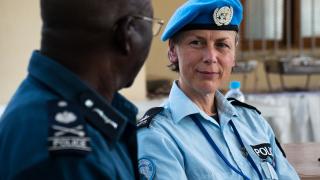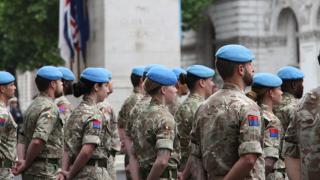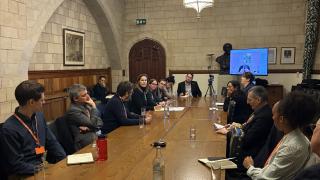
On 8 September, the UK hosted a major Peacekeeping Defence Ministerial, building on last year's US-led summit at the UN, at which several countries - including Britain - pledged peacekeeping troops.
Attended by over 60 states, the conference Communiqué reaffirmed that UN peacekeeping is "an indispensable part of the international community's response to threats" and therefore "in the national security interest of all nations". It acknowledged the changing demands of modern conflicts, including the increasing need to protect civilians and respond to asymmetric threats, and called for improvements in three areas of peacekeeping: planning, pledges and performance.
On the eve of the conference, UNA-UK and its partners, Chatham House and the University of Reading, held a roundtable that brought together some 40 participants from the UN, government, armed forces, academia and civil society to generate key considerations on strengthening peace operations. Previously, UNA-UK, along with a group consisting largely of humanitarian NGOs, had sent more detailed recommendations to the UK Foreign & Commonwealth Office and Ministry of Defence. These included suggestions that UNA-UK has put to the UK in the past, as part of its peace operations programme and work on the UK's national security strategy.
The Defence Ministerial Communiqué echoed many of these considerations and recommendations.
Pledges
UNA-UK was delighted by the UK's pledging of a further 100 troops to the UN mission in South Sudan, following last year's pledge of up to 300 troops, and by the Defence Secretary's framing of this deployment in national security terms.
Apart from the essential role that UN peace operations can play in assisting countries in transitioning to sustainable peace, they are also extremely valuable from a national security perspective. UN missions can serve as tools for achieving UK interests in preventing conflict, sexual violence, mass displacement and extremism, and in building stable, prosperous trading environments. They provide a framework for the UK to make strategic deployments to missions that are collectively funded and implemented; have the legitimacy of UN authorisation; and address situations of potential risk to UK interests but where unilateral or NATO action is not feasible.
UNA-UK was also pleased that the Communiqué emphasised the need to bolster the UN's rapid response capability, with pledges sought from states to provide troops. And we welcome the specific target that by the end of 2016, 4,000 of the troops and police pledged are at the Rapid Deployment Level. We hope that the UK will give serious consideration to supporting rapid deployment. This would represent an important step up from the provision of "niche capabilities" such as engineers, to reinforcement of missions at key points, for example, when extra capacity is needed to protect civilians or stabilise a situation. Implementing this would require troops to be earmarked and included in force generation, as part of a broader UK strategy on peace operations.
Finally, we support the call for renewed emphasis on increasing the number of women in peace operations. In this regard, we urge the UK to set an example by supporting female candidates for senior positions, and by ensuring that UN peacekeeping is seen as a desirable career choice for women and men serving in the armed forces. National recognition of British peacekeepers would contribute to this - this is something that UNA-UK continues to call for.
Planning
UNA-UK was pleased that the Communiqué reiterated the need for better planning, for effective consultations with troop- and police-contributing countries, and for the involvement of women at all stages of the planning process. We were also pleased that it supported our call for strategic communications, including the need to communicate the role and objectives of the mission to the local population.
We urge the UK, which plays a crucial role in setting mandates through the Security Council, to support the setting of clear mission objectives, requirements and host-country responsibilities during initial mandate negotiations.
We also urge the UK to support efforts to create a shared understanding of when and how the use of force can contribute to mission objectives, including the protection of civilians. This should include the development of general guidance on planning and rules of engagement, as well as field scenario planning exercises to avoid a one-size-fits-all approach.
In addition, we encourage the UK to support efforts to clarify what the terms "local ownership" and "community engagement" mean in principle and practice. This could involve providing small amounts of funding to facilitate UN engagement with research institutions to identify and analyse best practices and lessons learned.
Performance
UNA-UK was delighted by the focus on performance and accountability, and the emphasis on improved training and recruitment processes.
In particular, we were pleased by the reaffirmation of the Secretary-General's role in reporting and taking swift action on misconduct. We were also pleased by the support for mentoring of senior leaders, and for recruitment processes based on merit. This is in line with UNA-UK's campaign to improve how the UN Secretary-General is selected. We urge the UK to support the creation of an advisory panel to assist the Secretary-General in making senior peace operations appointments.
While we commend the focus on preventing and addressing sexual exploitation and abuse (SEA) - especially the recognition that "victims must be placed at the centre" of such efforts - we were disappointed that the opportunity was not used to build on existing measures. Despite the progress made through Security Council resolutions 1960, 2016 and 2272, there is still a deep accountability gap as peacekeepers remain under the jurisdiction of their state.
Given how damaging such cases are to peace operations and the UN as a whole, not to mention the victims and communities concerned, UNA-UK believes that it is high time for an international accountability mechanism to deal with SEA cases, which a growing number of experts, including UN Women and the House of Lords Committee on Sexual Violence in Conflict, support. This will be the focus of UNA-UK's next major reform campaign, and we urge the UK to champion this initiative.






